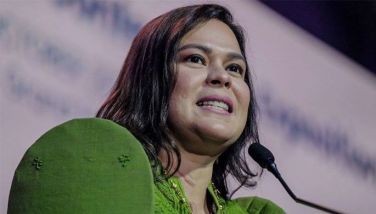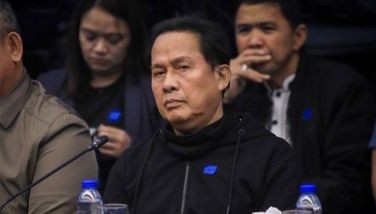Crude oil levy increased to 5 percent
August 1, 2004 | 12:00am
President Arroyo has reportedly signed a "midnight" executive order (EO) raising the levy on imported crude oil to five percent from the current rate of three percent.
The EO was signed last July 23, three days before the 13th Congress started its first regular session. The Constitution provides that the President can exercise legislative powers to raise taxes while Congress is not in session.
Malacañang has not officially announced or released if indeed Mrs. Arroyo has signed the EO, but Energy Secretary Vicente Perez confirmed in a radio interview that she has signed it.
Presidential Spokesman Ignacio Bunye said he heard the EO mentioned during their Cabinet meeting at the Palace last week.
"We will find out if the EO has already been signed," he told reporters last Friday.
In an interview aired over dzMM a day after Mrs. Arroyo delivered her State of the Nation Address at the opening of the 13th Congress last July 26, Perez clarified that while Mrs. Arroyo has signed the EO, the higher tariff on imported crude oil products will not result in any increase in the pump prices of gasoline and other refined petroleum products.
"We won’t implement it yet until we’re sure that the world prices of crude oil would go down. The higher tariff would take effect at the same (as) the rollback in crude oil prices in the world market to offset any increase in the pump prices of gasoline," Perez said.
"We don’t like the pump prices to increase. That’s the order of the President but it would help in reducing the deficit," he added.
Perez said this higher tariff will mean an addition P4.4 billion in revenues to help narrow down this year’s budget deficit, with its ceiling set at P197 billion.
He said this EO will remain in effect until Congress can pass into law the President’s proposed bill increasing the tariff on imported crude oil products — one of the eight tax reform bills she mentioned last Monday in her address.
As of yesterday, Malacañang has yet to submit one of Mrs. Arroyo’s proposed tax reform measures to Congress. — Marichu Villanueva
The EO was signed last July 23, three days before the 13th Congress started its first regular session. The Constitution provides that the President can exercise legislative powers to raise taxes while Congress is not in session.
Malacañang has not officially announced or released if indeed Mrs. Arroyo has signed the EO, but Energy Secretary Vicente Perez confirmed in a radio interview that she has signed it.
Presidential Spokesman Ignacio Bunye said he heard the EO mentioned during their Cabinet meeting at the Palace last week.
"We will find out if the EO has already been signed," he told reporters last Friday.
In an interview aired over dzMM a day after Mrs. Arroyo delivered her State of the Nation Address at the opening of the 13th Congress last July 26, Perez clarified that while Mrs. Arroyo has signed the EO, the higher tariff on imported crude oil products will not result in any increase in the pump prices of gasoline and other refined petroleum products.
"We won’t implement it yet until we’re sure that the world prices of crude oil would go down. The higher tariff would take effect at the same (as) the rollback in crude oil prices in the world market to offset any increase in the pump prices of gasoline," Perez said.
"We don’t like the pump prices to increase. That’s the order of the President but it would help in reducing the deficit," he added.
Perez said this higher tariff will mean an addition P4.4 billion in revenues to help narrow down this year’s budget deficit, with its ceiling set at P197 billion.
He said this EO will remain in effect until Congress can pass into law the President’s proposed bill increasing the tariff on imported crude oil products — one of the eight tax reform bills she mentioned last Monday in her address.
As of yesterday, Malacañang has yet to submit one of Mrs. Arroyo’s proposed tax reform measures to Congress. — Marichu Villanueva
BrandSpace Articles
<
>
- Latest
- Trending
Trending
Latest
Trending
Latest
Recommended
































